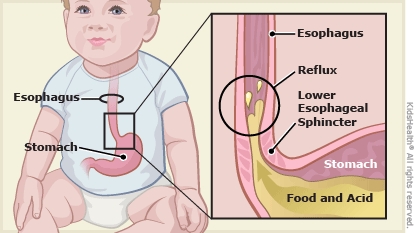Gastroesophageal reflux — also called reflux — is when food and acid from the stomach go back up into the esophagus, and sometimes out the mouth or nose. It's normal for babies to have reflux and some spitting up. Most reflux gets better on its own by the time a baby is 1 year old. Changes in feeding can help. Follow these instructions to care for your baby.



Your baby:

Your baby throws up blood or bile (a green or yellow liquid).

What causes reflux? Reflux happens because a ring of muscle at the bottom of the esophagus (the tube that runs from the mouth to the stomach) does not close all the way. This ring of muscle is called the lower esophageal sphincter (LES). If the LES does not close all the way, breast milk, formula, food, and fluid from the stomach can come up the esophagus and sometimes out the mouth or nose.
What's the difference between reflux and GERD? Reflux that causes problems like poor growth or damage to the esophagus is called gastroesophageal reflux disease (GERD). GERD is more serious than reflux and might be treated with medicine. Reflux almost always goes away by the time a baby is 1 year old, but GERD is more likely to continue.